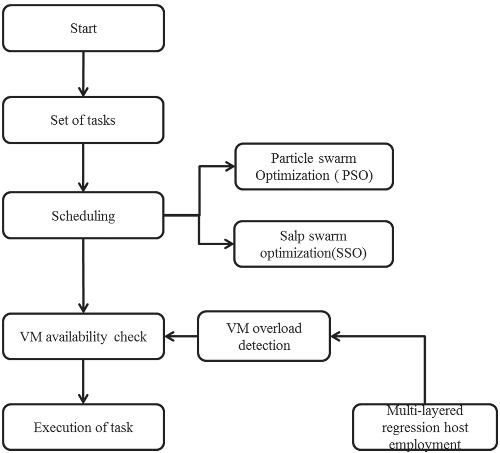当前位置:
X-MOL 学术
›
Int. J. Commun. Syst.
›
论文详情
Our official English website, www.x-mol.net, welcomes your feedback! (Note: you will need to create a separate account there.)
Hybrid swarm optimization algorithm based on task scheduling in a cloud environment
International Journal of Communication Systems ( IF 2.1 ) Pub Date : 2021-06-28 , DOI: 10.1002/dac.4694 Heba M. Eldesokey 1, 2 , Saied M. Abd El‐atty 2 , Walid El‐Shafai 2, 3 , Mohammed Amoon 4, 5 , Fathi E. Abd El‐Samie 2, 6
International Journal of Communication Systems ( IF 2.1 ) Pub Date : 2021-06-28 , DOI: 10.1002/dac.4694 Heba M. Eldesokey 1, 2 , Saied M. Abd El‐atty 2 , Walid El‐Shafai 2, 3 , Mohammed Amoon 4, 5 , Fathi E. Abd El‐Samie 2, 6
Affiliation

|
Cloud computing is the current computing standard, which provides information technology (IT) services over the Internet on demand. In the cloud environment, a task is mapped with an available resource to attain a good result. Task scheduling is the technique that is used to allocate tasks on virtual machines (VMs) of a server based on its capacity of workload. Tasks are scheduled to the server in such a way to minimize traffic and time delay. Particle swarm optimization (PSO) is the best existing algorithm used to schedule a task to an existing resource on the environment of the cloud. By PSO, the task is scheduled for an existing resource to reduce computational cost. In this paper, a hybrid swarm optimization (HSO) algorithm, which is the combination of PSO and salp swarm optimization (SSO), is proposed to resolve task scheduling issues in the cloud environment. The main goal of HSO is to schedule the task to the available resource in such a way to reduce the execution time and computation cost. Multilayer logistic regression (MLR) is an approach used to detect the overloaded VMs, so that a task can be scheduled to a VM according to its capacity of workload. The proposed HSO algorithm with MLR is simulated on the cloudsim toolkit, and the results reveal the efficiency of the proposed algorithm in terms of cost, execution time, and makespan. Compared to the existing algorithms such as the genetic algorithms (GAs), the improved efficiency evolution (IDEA), and the PSO, the proposed algorithm reveals superiority in terms of efficiency, resource utilization, and speed.
中文翻译:

云环境下基于任务调度的混合群优化算法
云计算是当前的计算标准,它通过 Internet 按需提供信息技术 (IT) 服务。在云环境中,将任务与可用资源进行映射以获得良好的结果。任务调度是一种用于根据服务器的工作负载容量在服务器的虚拟机 (VM) 上分配任务的技术。以最小化流量和时间延迟的方式将任务调度到服务器。粒子群优化 (PSO) 是用于将任务调度到云环境中的现有资源的最佳现有算法。通过 PSO,为现有资源调度任务以降低计算成本。在本文中,混合群优化(HSO)算法是PSO和salp群优化(SSO)的结合,提出解决云环境中的任务调度问题。HSO 的主要目标是以减少执行时间和计算成本的方式将任务调度到可用资源。多层逻辑回归 (MLR) 是一种用于检测超载 VM 的方法,以便可以根据 VM 的工作负载容量将任务调度到 VM。在 cloudsim 工具包上模拟了所提出的带有 MLR 的 HSO 算法,结果揭示了所提出算法在成本、执行时间和完工时间方面的效率。与现有的遗传算法(GAs)、改进的效率进化(IDEA)、PSO等算法相比,该算法在效率、资源利用和速度方面均具有优势。HSO 的主要目标是以减少执行时间和计算成本的方式将任务调度到可用资源。多层逻辑回归 (MLR) 是一种用于检测超载 VM 的方法,以便可以根据 VM 的工作负载容量将任务调度到 VM。在 cloudsim 工具包上模拟了所提出的带有 MLR 的 HSO 算法,结果揭示了所提出算法在成本、执行时间和完工时间方面的效率。与现有的遗传算法(GAs)、改进的效率进化(IDEA)、PSO等算法相比,该算法在效率、资源利用和速度方面均具有优势。HSO 的主要目标是以减少执行时间和计算成本的方式将任务调度到可用资源。多层逻辑回归 (MLR) 是一种用于检测超载 VM 的方法,以便可以根据 VM 的工作负载容量将任务调度到 VM。在 cloudsim 工具包上模拟了所提出的带有 MLR 的 HSO 算法,结果揭示了所提出算法在成本、执行时间和完工时间方面的效率。与现有的遗传算法(GAs)、改进的效率进化(IDEA)、PSO等算法相比,该算法在效率、资源利用和速度方面均具有优势。多层逻辑回归 (MLR) 是一种用于检测超载 VM 的方法,以便可以根据 VM 的工作负载容量将任务调度到 VM。在 cloudsim 工具包上模拟了所提出的带有 MLR 的 HSO 算法,结果揭示了所提出算法在成本、执行时间和完工时间方面的效率。与现有的遗传算法(GAs)、改进的效率进化(IDEA)、PSO等算法相比,该算法在效率、资源利用和速度方面均具有优势。多层逻辑回归 (MLR) 是一种用于检测超载 VM 的方法,以便可以根据 VM 的工作负载容量将任务调度到 VM。在 cloudsim 工具包上模拟了所提出的带有 MLR 的 HSO 算法,结果揭示了所提出算法在成本、执行时间和完工时间方面的效率。与现有的遗传算法(GAs)、改进的效率进化(IDEA)、PSO等算法相比,该算法在效率、资源利用和速度方面均具有优势。和完工时间。与现有的遗传算法(GAs)、改进的效率进化(IDEA)、PSO等算法相比,该算法在效率、资源利用和速度方面均具有优势。和完工时间。与现有的遗传算法(GAs)、改进的效率进化(IDEA)、PSO等算法相比,该算法在效率、资源利用和速度方面均具有优势。
更新日期:2021-08-04
中文翻译:

云环境下基于任务调度的混合群优化算法
云计算是当前的计算标准,它通过 Internet 按需提供信息技术 (IT) 服务。在云环境中,将任务与可用资源进行映射以获得良好的结果。任务调度是一种用于根据服务器的工作负载容量在服务器的虚拟机 (VM) 上分配任务的技术。以最小化流量和时间延迟的方式将任务调度到服务器。粒子群优化 (PSO) 是用于将任务调度到云环境中的现有资源的最佳现有算法。通过 PSO,为现有资源调度任务以降低计算成本。在本文中,混合群优化(HSO)算法是PSO和salp群优化(SSO)的结合,提出解决云环境中的任务调度问题。HSO 的主要目标是以减少执行时间和计算成本的方式将任务调度到可用资源。多层逻辑回归 (MLR) 是一种用于检测超载 VM 的方法,以便可以根据 VM 的工作负载容量将任务调度到 VM。在 cloudsim 工具包上模拟了所提出的带有 MLR 的 HSO 算法,结果揭示了所提出算法在成本、执行时间和完工时间方面的效率。与现有的遗传算法(GAs)、改进的效率进化(IDEA)、PSO等算法相比,该算法在效率、资源利用和速度方面均具有优势。HSO 的主要目标是以减少执行时间和计算成本的方式将任务调度到可用资源。多层逻辑回归 (MLR) 是一种用于检测超载 VM 的方法,以便可以根据 VM 的工作负载容量将任务调度到 VM。在 cloudsim 工具包上模拟了所提出的带有 MLR 的 HSO 算法,结果揭示了所提出算法在成本、执行时间和完工时间方面的效率。与现有的遗传算法(GAs)、改进的效率进化(IDEA)、PSO等算法相比,该算法在效率、资源利用和速度方面均具有优势。HSO 的主要目标是以减少执行时间和计算成本的方式将任务调度到可用资源。多层逻辑回归 (MLR) 是一种用于检测超载 VM 的方法,以便可以根据 VM 的工作负载容量将任务调度到 VM。在 cloudsim 工具包上模拟了所提出的带有 MLR 的 HSO 算法,结果揭示了所提出算法在成本、执行时间和完工时间方面的效率。与现有的遗传算法(GAs)、改进的效率进化(IDEA)、PSO等算法相比,该算法在效率、资源利用和速度方面均具有优势。多层逻辑回归 (MLR) 是一种用于检测超载 VM 的方法,以便可以根据 VM 的工作负载容量将任务调度到 VM。在 cloudsim 工具包上模拟了所提出的带有 MLR 的 HSO 算法,结果揭示了所提出算法在成本、执行时间和完工时间方面的效率。与现有的遗传算法(GAs)、改进的效率进化(IDEA)、PSO等算法相比,该算法在效率、资源利用和速度方面均具有优势。多层逻辑回归 (MLR) 是一种用于检测超载 VM 的方法,以便可以根据 VM 的工作负载容量将任务调度到 VM。在 cloudsim 工具包上模拟了所提出的带有 MLR 的 HSO 算法,结果揭示了所提出算法在成本、执行时间和完工时间方面的效率。与现有的遗传算法(GAs)、改进的效率进化(IDEA)、PSO等算法相比,该算法在效率、资源利用和速度方面均具有优势。和完工时间。与现有的遗传算法(GAs)、改进的效率进化(IDEA)、PSO等算法相比,该算法在效率、资源利用和速度方面均具有优势。和完工时间。与现有的遗传算法(GAs)、改进的效率进化(IDEA)、PSO等算法相比,该算法在效率、资源利用和速度方面均具有优势。


























 京公网安备 11010802027423号
京公网安备 11010802027423号